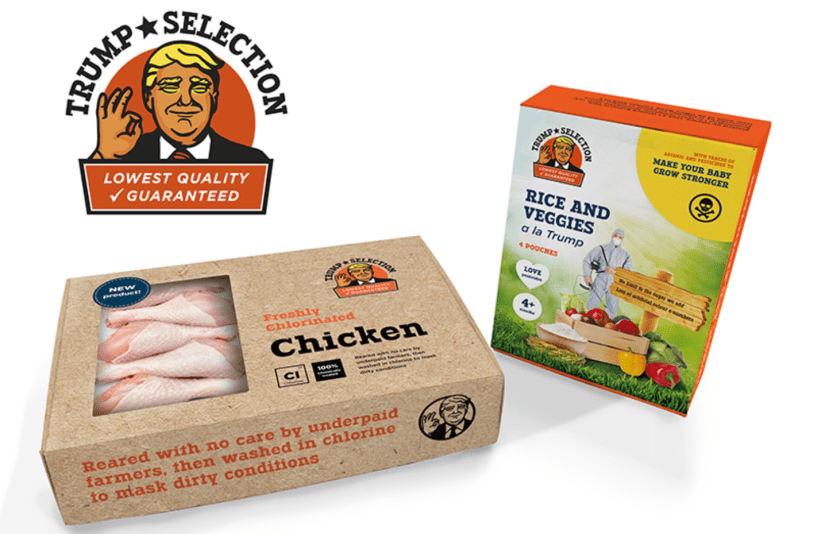Trump in your trolley: how big business is pushing for lower standards through a trade deal with the US

By Jean Blaylock: Big business wants to use a US-UK trade deal as a way to get deregulation that they have long been pushing for. Transnational corporations try to justify this by saying it would be easier for them to produce to one set of standards, but somehow it is always the lowest common denominator that they push for, not a raising of standards across the board.
We can see this across a range of areas, from the environment to the online digital world (and the US isn’t always the bad guy by the way – in financial services for example, the UK has riskier standards). Food standards though, are one of the clearest ways in which we could see changes in our everyday lives if a trade deal with the Trump administration goes through.
We can see this with two iconic things you might buy in your supermarket: chicken and baby food.
Chlorinated chicken
The UK currently takes a ‘farm to fork’ approach to health and safety in farming, trying to keep conditions clean at all stages of production. We also have comparatively strong animal welfare standards. This means healthier, better conditions for animals throughout their lives, with less chance for disease to spread at any point. That’s also better for workers too.
In the US, by contrast, they tolerate dirtier conditions throughout and compensate by bleaching everything with a substance such as chlorine dioxide at the end (they’re called ‘pathogen reduction treatments’ or PRTs).
The problem with chlorinated chicken is not the chlorine, as such. It is that with low animal welfare and a low hygiene approach to farming, you get more chance of disease spreading at many stages throughout the process.
The US approach also carries more risk of food poisoning. Food poisoning rates are higher in the US than the UK – by up to ten times as much – although methods of compiling statistics are not quite the same so they aren’t exactly comparable. Partly this is because of more opportunities for disease to spread, but recent research also suggests that chlorine washes may not actually kill the pathogens that cause food poisoning, but instead only mask them.
The UK even accepted the US’s offer of assistance in a PR exercise of selling chlorinated chicken to the UK public.
SafeSubcribe/Instant Unsubscribe - One Email, Every Sunday Morning - So You Miss Nothing - That's It
Ministers’ promises
Why does this matter though, since the environment minister, Villiers, recently said that chlorine chicken would not be allowed into the UK? Well it matters because we’ve heard those promises before and seen them broken.
Back in 2017, there was a spat between then environment minister, Gove, and then trade minister, Fox, when Gove equally emphatically said chlorine chicken would not be included. The trade talks between the US and the UK have been being happening in secret, so at the time the public had nothing to go on but the ministers’ words. At the end of last year, however, documents from the talks leaked. And in the leaked papers we can see that several months after Gove’s promises, chlorine chicken was in fact in the being discussed. The UK even accepted the US’s offer of assistance in a PR exercise of selling chlorinated chicken to the UK public.
We need to keep up the pressure on ministers, to hold them accountable to their promises.
A recent test of baby foods in the US found that 95% contained toxic minerals and 73% had arsenic.
Baby food
The UK has specific food regulations for baby food, over and above normal food standards. These include:
- blanket maximum residue level for all pesticides which is set very low, with even lower levels for some specific pesticides
- maximum level for traces of arsenic in rice set at ten times lower than the level for adult foods
- complete ban on artificial colour e-numbers
- limits on added sugar
The US has no specific regulations for baby food, and has no equivalents to these points.
The US has limits around specific pesticides, but no comprehensive blanket level for any pesticide in baby food. During the earlier failed trade negotiations between the EU and the US, TTIP, pesticide industry bodies pushed hard to undermine the EU’s tougher pesticide rules.
A recent test of baby foods in the US found that 95% contained toxic minerals and 73% had arsenic. The US has no regulations about arsenic residues. There have been attempts to a limit, but this has been blocked by agribusiness lobbying in Congress. Trace amounts of arsenic get into food both because it occurs naturally in the earth’s crust and because it was previously used as a pesticide. It can concentrate in crops grown in water, like rice, which is why the UK regulation concerns rice.
Both the UK and the US have individual restrictions on specific artificial colours that apply to any food. In particular, in the UK, food that contains any of six colourings that have been shown to have links with hyperactivity in children must carry warning labels. However on top of the individual restrictions, the UK has a complete ban on colouring in baby food, which the US does not.
On sugar, nutritionists are pushing for the UK’s existing limits to be strengthened – they are a start. The US does not have any limits. Tests on baby food in the US do show that in practice sugar is mainly added to toddler snack food.
Take action
Help raise awareness of the risks posed by a trade deal with the US, through our Trump in your Trolley action. Take our special ‘Trump selection’ boxes of chlorinated chicken and baby food to your local supermarket, and share the photos on social media, to spread the word.
This article was published at Global Justice Now



